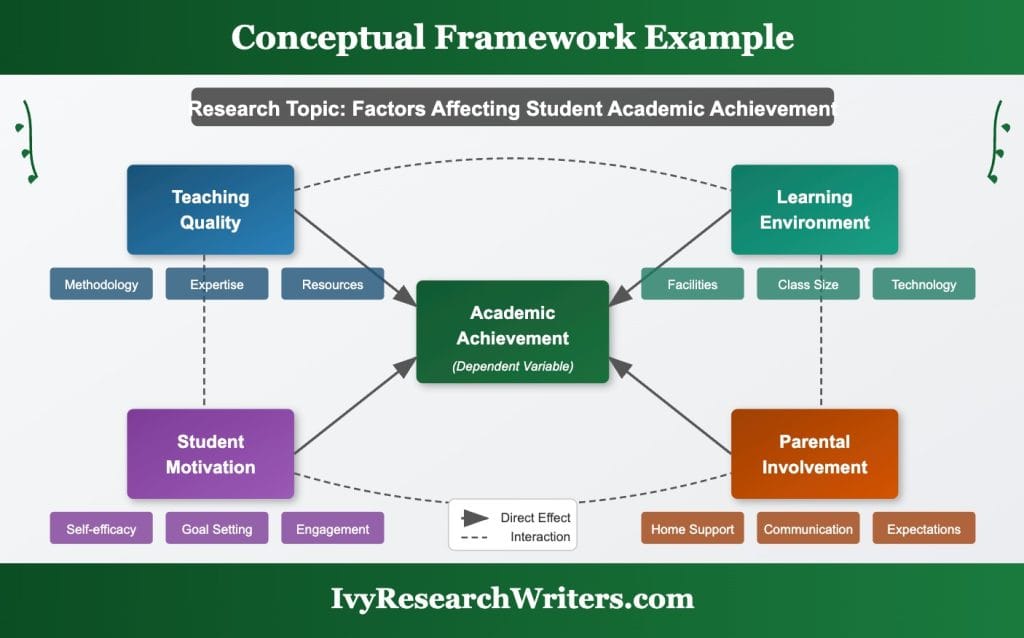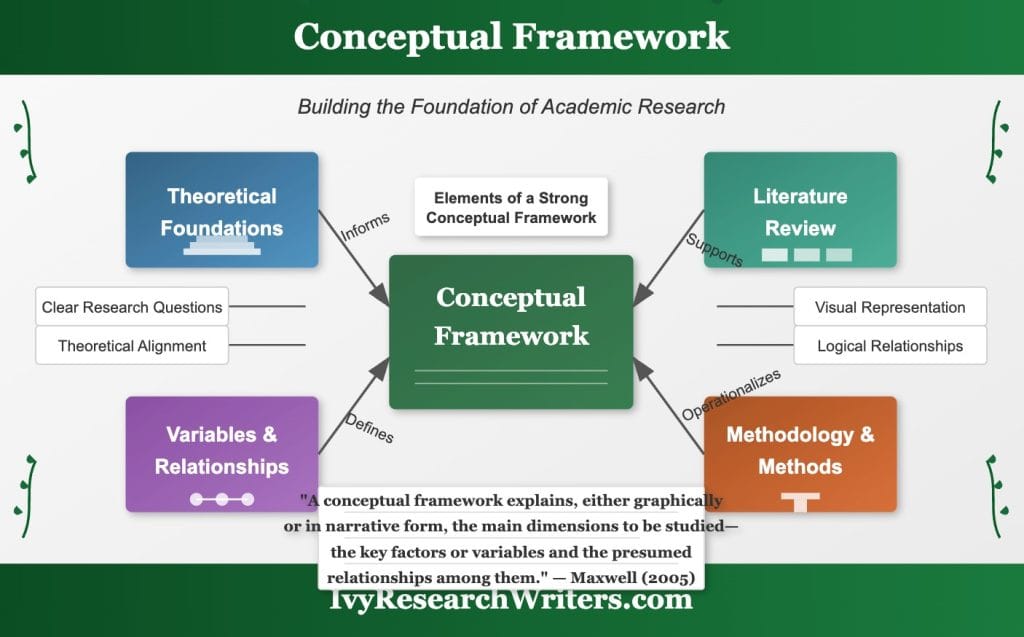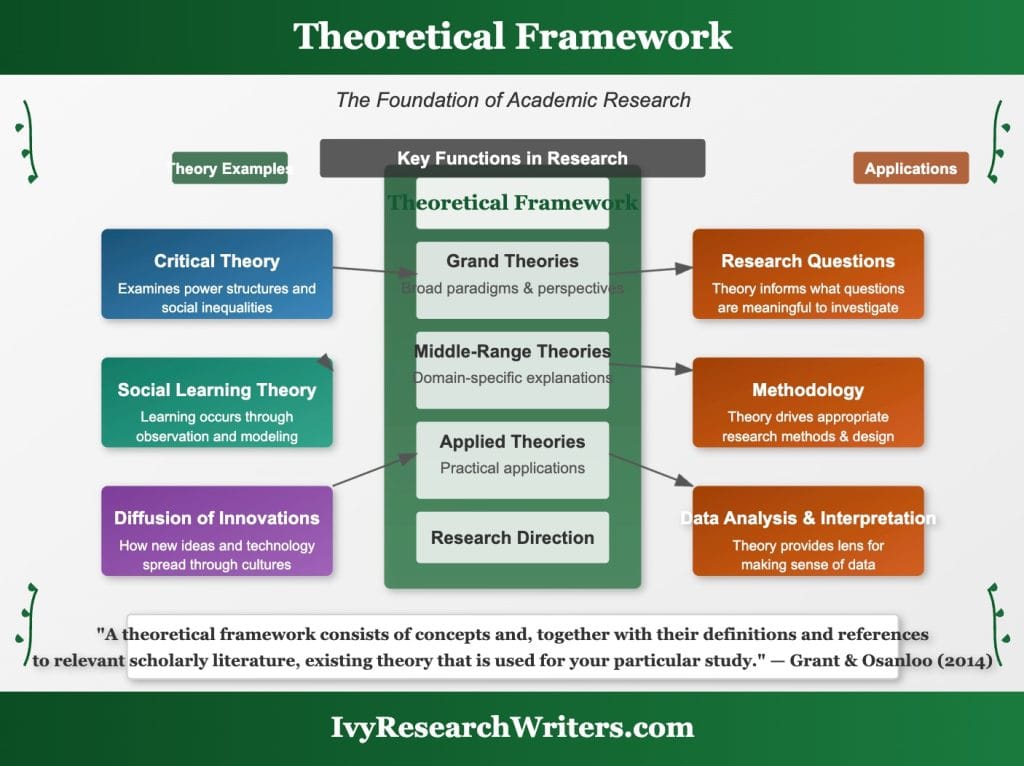Conceptual Framework Examples: A Comprehensive Guide

What Is a Conceptual Framework?
A conceptual framework is a structured representation of key concepts, variables, and their relationships within a research study. It serves as a blueprint that guides the research process by defining the theoretical foundation and outlining the direction of the study. A well-developed conceptual framework helps researchers clarify research objectives, structure their methodology, and interpret findings effectively.
In academic research, a conceptual framework connects theory, literature, and empirical findings, making it a crucial part of theses, dissertations, and journal articles. It ensures that a study has a logical flow and is grounded in established knowledge.
Conceptual Framework vs. Theoretical Framework
While the conceptual framework and theoretical framework are related, they have distinct purposes:
- Theoretical Framework: Based on existing theories, it provides a broad explanation of a research topic.
- Conceptual Framework: A specific research model that defines the concepts and relationships relevant to a study.
The conceptual framework operationalizes the theoretical framework, making it more practical and research-specific.
Why Is a Conceptual Framework Important in Research?
A conceptual framework:
- Clarifies Research Focus – Helps researchers define the scope of their study and identify key variables.
- Establishes Relationships – Demonstrates how different factors interact within the research topic.
- Guides Data Collection – Ensures that the study remains structured and aligned with research questions.
- Provides a Basis for Analysis – Helps researchers interpret data and draw conclusions.
- Enhances Research Credibility – Strengthens the logical and theoretical foundation of the study.
Get professional research writing assistance tailored to your academic goals. Start your success story with us today!
How to Develop a Conceptual Framework
Creating a conceptual framework involves several key steps:
Step 1: Identify the Research Problem
- Clearly define the problem your study aims to address.
- Example: How does social media usage impact students’ academic performance?
Step 2: Conduct a Literature Review
- Review existing studies related to your topic.
- Identify relevant theories, models, and empirical findings.
Step 3: Define Key Variables
- Identify the independent, dependent, and moderating/mediating variables.
- Example:
- Independent Variable: Social media usage
- Dependent Variable: Academic performance
- Mediating Variable: Study habits
Step 4: Establish Relationships Between Variables
- Determine how variables interact within the study.
- Develop hypotheses based on theoretical support.
Step 5: Create a Visual Representation
- Use flowcharts, diagrams, or models to illustrate relationships.
- Ensure clarity in the design to make it easily interpretable.
Struggling with your research paper? Let our expert writers deliver original, high-quality papers on time. Order now!
Conceptual Framework Examples
Example 1: Conceptual Framework for Social Media and Academic Performance
Research Question: How does social media usage affect students’ academic performance?
Conceptual Framework Structure:
- Independent Variable: Social Media Usage
- Dependent Variable: Academic Performance
- Mediating Variables: Study Habits, Time Management
- Moderating Variables: Type of Social Media (Educational vs. Non-Educational), Parental Supervision
Diagram Representation:

This framework explains how social media usage can either positively or negatively influence academic performance through different pathways.
Example 2: Conceptual Framework for Employee Motivation and Productivity
Research Question: How does employee motivation affect workplace productivity?
Key Variables:
- Independent Variable: Employee Motivation
- Dependent Variable: Workplace Productivity
- Moderating Variable: Leadership Style
- Mediating Variable: Job Satisfaction
Diagram Representation:

This framework highlights that job satisfaction mediates the relationship between motivation and productivity, while leadership style moderates the effects of motivation.
Example 3: Conceptual Framework for Online Learning and Student Engagement
Research Question: How does online learning impact student engagement?
Conceptual Framework Structure:
- Independent Variable: Online Learning
- Dependent Variable: Student Engagement
- Moderating Variable: Course Design, Instructor Feedback
- Mediating Variable: Learning Strategies, Technical Skills
Diagram Representation:

This framework demonstrates how different factors influence the success of online learning and student engagement.
Best Practices for Developing a Conceptual Framework
- Ensure Clarity and Simplicity – The framework should be easy to understand.
- Base It on Strong Literature – Support relationships with existing studies.
- Use Visuals When Possible – A diagram enhances comprehension.
- Define Variables Clearly – Ensure that independent, dependent, and other variables are well explained.
- Align It with Research Objectives – The framework should directly relate to the study’s aims.
Unlock exclusive discounts and offers on premium writing services. Don’t miss out—grab the best deals today!
What is a Conceptual Framework in Research?
A conceptual framework in research is a structured approach that outlines the relationships between variables and concepts within a study. It provides a visual and theoretical representation of how different elements connect to address a research problem.

Researchers use a conceptual framework to:
- Define key independent and dependent variables
- Identify moderating or mediating factors
- Establish a logical flow of ideas
- Support hypotheses with existing theories
A well-developed conceptual framework ensures clarity, direction, and consistency in research, making it an essential component in academic writing, dissertations, and empirical studies.
Reflexivity & Triangulation in Qualitative Research
Reflexivity and triangulation are crucial techniques in qualitative research to ensure credibility, reliability, and depth in findings.
Reflexivity in Research
Reflexivity involves researchers critically examining their role, biases, and perspectives within the study. It ensures that personal beliefs and assumptions do not affect data collection and interpretation. Researchers use reflexivity to:
- Acknowledge personal influence on the study
- Enhance transparency in research methods
- Improve objectivity in analysis
Triangulation in Research
Triangulation refers to using multiple methods, sources, or theories to validate findings. It strengthens research by:
- Combining different data sources (e.g., interviews, surveys, and observations)
- Applying various theoretical perspectives
- Ensuring data accuracy and reliability
By incorporating reflexivity and triangulation, qualitative research becomes more credible, rigorous, and comprehensive.
Example of a Conceptual Framework in Dissertation
A conceptual framework in a dissertation helps structure research questions, define relationships, and support findings. Below is an example:
Topic: The Impact of Remote Work on Employee Productivity
Conceptual Framework Structure:
- Independent Variable: Remote Work
- Dependent Variable: Employee Productivity
- Mediating Variable: Work-Life Balance
- Moderating Variable: Management Support
Visual Representation:

This framework demonstrates how remote work affects employee productivity, with work-life balance as a mediating factor and management support as a moderating variable.
Selecting Independent and Dependent Variables
Independent and dependent variables form the core of a conceptual framework.
- Independent Variable (IV): The factor that influences or causes changes in another variable.
- Dependent Variable (DV): The outcome that is measured and affected by the independent variable.
Steps to Select Variables:
- Identify the research problem – Define the focus of the study.
- Review literature – Find previous studies related to the topic.
- Establish cause-and-effect relationships – Determine how variables interact.
- Ensure measurability – Variables should be clearly defined and testable.
For example, in a study on social media and mental health:
- IV: Social Media Usage
- DV: Anxiety Levels
Selecting the right variables ensures a structured and focused research approach.
what is theoretical framework in research

What is the theoretical framework in research? It serves as a foundational structure that guides the study, outlining the theories and concepts that inform the research process. This framework is critical for understanding the relationships between variables, distinguishing it from a conceptual framework, which is more visually oriented.
To explain the theoretical framework, it integrates existing theories to create a basis for hypotheses and analysis. For instance, theoretical nursing frameworks often guide nursing research by providing a structured approach to understanding patient care. Can you provide examples of successful conceptual frameworks in research? Yes, frameworks like the Health Belief Model illustrate effective applications.
In summary, the theoretical framework of a research defines the study’s scope, while understanding theoretical framework versus conceptual framework helps clarify their distinct roles. A solid theory conceptual framework allows researchers to articulate their study’s rationale and significance, reinforcing its validity and reliability.
Theoretical framework conceptual framework

Theoretical framework plays a critical role in guiding research by providing a structured approach to understand phenomena. To explain theoretical framework, it serves as the foundation for analyzing variables and establishing relationships. In contrast, the theoretical framework versus conceptual framework distinction highlights how the former focuses on existing theories while the latter is more about visualizing ideas.
In fields like nursing, theoretical nursing frameworks illustrate how concepts interrelate and inform practice. Researchers often seek to understand what is the theoretical framework and what is conceptual framework, as both are essential for a sound research design. Can you provide examples of successful conceptual frameworks in research? These frameworks effectively illustrate complex relationships and enhance understanding.
Overall, a theoretical or conceptual framework is vital for any research project, forming the backbone of the inquiry. A well-defined theory conceptual framework not only clarifies the research process but also supports the findings. Understanding these frameworks enhances critical thinking and fosters innovative research outcomes.
Conceptual framework theoretical framework
What is a conceptual framework? It serves as a visual or written representation of the key concepts and variables in research. A theoretical framework definition provides a structure for the study, guiding the analysis. For instance, a theoretical framework in research example might illustrate the relationships between variables in a sample conceptual model.
In the context of social sciences, the theoretical framework of social work integrates various theoretical frameworks in social work to inform practice. Understanding theoretical frameworks vs conceptual frameworks helps clarify their distinct but complementary roles. Researchers often seek to provide examples of successful conceptual frameworks in research to support their findings.
The theoretical conceptual framework assists in framing research questions and hypotheses. A well-structured theoretical research framework enhances the credibility of the study. By exploring the nuances of theoretical versus conceptual framework, one can better appreciate the theoretical framework theories that underpin social work methodologies and practices.
Ultimately, understanding theory vs conceptual framework allows researchers to delineate their approach effectively. Whether through a theoretical framework sample or an applied theoretical framework social work, these frameworks remain integral to advancing knowledge in various disciplines.
What is in a conceptual framework?
What is a conceptual framework? It serves as a foundational structure for research, guiding the study’s design and methodology. A theoretical framework provides a lens through which to interpret findings. For example, a sample of theoretical and conceptual framework in thesis might illustrate how theories for theoretical framework inform the research question.
When discussing theoretical vs conceptual framework, it’s important to note that the theoretical framework draws on established theories, while the conceptual framework theory focuses on specific constructs. An existing framework, like the IFRS conceptual framework, offers guidelines for accounting practices, demonstrating how conceptual frameworks can operate in various fields.
In essence, what is a theoretical framework? It is a structured approach to understanding the relationships between variables. In contrast, what is the meaning of theoretical framework in research involves using established theories to support findings. Understanding the theoretical domains framework can enhance the robustness of your research.
Ultimately, a theoretical foundation or framework abstract is crucial for any study. It helps clarify what are theoretical frameworks and lays the groundwork for discussing types of theoretical framework. The distinction between theory and conceptual framework becomes evident when analyzing how each contributes to research integrity.
What are the 5 elements of the conceptual framework?
Understanding the conceptual framework defined is crucial in research, especially when differentiating between conceptual vs theoretical framework. The five elements of the conceptual framework often include the problem statement, literature review, theoretical framework, methodology, and data analysis. For instance, a research example conceptual framework could illustrate how the theoretical framework in research guides study design.
In accounting, the conceptual framework accounting FASB and the IASB conceptual framework provide a foundation for financial reporting. Successful conceptual frameworks in research include frameworks from various fields, such as the theoretical framework in nursing or the theoretical framework for social work, showcasing their applicability across disciplines. A sample of a theoretical framework effectively demonstrates how key concepts interact.
To define theoretical framework, it serves as a guiding lens for understanding phenomena. It explains how and why certain variables connect, making it essential for theoretical framework in qualitative research. For example, a theoretical framework research example might illustrate the relationship between community engagement and mental health outcomes, highlighting the importance of a robust theoretical framework meaning in social science studies.
What are the 3 components of conceptual framework in research?
The conceptual framework is essential in research, comprising three key components: the definition of key concepts, the relationships between these concepts, and the theoretical basis. For example, the conceptual framework accounting established by FASB serves as a guideline for financial reporting. This framework helps delineate conceptual variables examples that can be measured.
When distinguishing conceptual framework vs theoretical framework, the former focuses on structuring ideas, while the latter involves the underlying theories that explain phenomena. A theoretical framework example in research can include models from social work theoretical frameworks, which provide context for understanding client interactions. Overall, defining and explaining the theoretical foundation is crucial for robust research.
What best describes a conceptual framework?
To define conceptual framework, it is a structured approach that outlines key concepts and variables within a research study. The conceptual framework meaning lies in its ability to clarify relationships between elements, guiding researchers in their inquiries. For instance, the FASB conceptual framework provides standards for accounting practices, while the IASB’s conceptual framework sets guidelines for financial reporting.
When considering conceptual framework versus theoretical framework, the former is more focused on practical applications, while the latter emphasizes underlying theories. Conceptual framework research examples can include studies that define conceptual variables and how they interact. An example of a theoretical framework might explore broader theories that inform a specific investigation, showcasing the differences in conceptual framework vs theory.
Ultimately, the definition of conceptual framework encompasses a blueprint for understanding complex relationships, with conceptual model samples often illustrating these dynamics. The research paper conceptual framework sample can demonstrate a researcher’s methodology in addressing specific questions, reinforcing the importance of a well-defined conceptual framework in research.
Elevate Your Academic Excellence
Enhance your success with professional research paper writing services from IvyResearchWriters. Receive original, meticulously crafted papers delivered promptly. Request your consultation today.
Making a Conceptual Framework
Creating a conceptual framework involves defining a structured approach to understanding complex ideas. In the context of research, a conceptual framework of a research project helps clarify relationships between variables. For instance, the accounting conceptual framework set by FASB and IASB illustrates how accounting principles guide financial reporting.
When asking, can you provide examples of conceptual frameworks in different fields? One might consider the theoretical framework used in psychology to explain behavior or the conceptual framework sample in education to evaluate student performance. These frameworks often provide clarity and direction, ensuring research is grounded in established theories and practices.
The definition of a conceptual framework emphasizes its role in guiding research, while examples of theoretical frameworks showcase their application across diverse disciplines. For researchers, understanding how to define a conceptual framework is crucial for developing robust studies that yield meaningful insights.
What is the Difference Between Theoretical and Conceptual Frameworks?
The difference between theoretical frameworks and conceptual frameworks lies in their application and purpose. A theoretical framework provides a broad explanation of phenomena, while a conceptual framework focuses on specific variables and their relationships. For instance, the conceptual framework for financial reporting by the FASB illustrates accounting principles, whereas a conceptual framework in qualitative research organizes ideas around a qualitative study.
Conceptual frameworks integrate various components to guide applied research and enhance understanding. In nursing, a conceptual framework nursing may address patient care variables. Successful examples of conceptual frameworks in research include the conceptual framework of financial reporting and frameworks in social science research, which help clarify research findings and direct future inquiries.
Understanding what is a conceptual framework is essential for any research project. It offers structure, guiding researchers through a review of existing literature to identify one independent variable and its impact. Consequently, recognizing the meaning of theoretical frameworks is crucial for framing questions and hypotheses, ultimately enhancing the explanatory power of the research.
How to Develop a Strong Conceptual Framework

To develop a strong conceptual framework, begin by reviewing existing literature to define your conceptual framework definition. This includes understanding the conceptual accounting framework provided by entities like the FASB for financial reporting. Incorporate both conceptual and theoretical frameworks to guide your dissertation research effectively.
Consider examples of successful conceptual frameworks in various fields, such as the conceptual framework for qualitative research or frameworks in quantitative data collection. Identify the focus of your research and determine how the framework is used to analyze the effect of the independent variable in a mixed methods approach.
Utilize your data collection and analysis to draw new insights that contribute to knowledge in the field. A well-defined framework used in your dissertation or thesis ensures clarity and strengthens your findings, paving the way for future research.
Meet Ivy Research Writers—your trusted experts committed to delivering academic excellence. Learn more about our team!
Choosing Research Questions
Research questions guide the study and define its purpose. Well-structured research questions should be:
- Clear and concise
- Specific and researchable
- Aligned with study objectives
Types of Research Questions:
- Descriptive – “What are the effects of social media on mental health?”
- Comparative – “How does online learning compare to traditional learning in student engagement?”
- Causal – “Does work-from-home increase employee productivity?”
Choosing the right research questions ensures that the conceptual framework and study remain focused, relevant, and impactful.
For expert help in developing a conceptual framework, selecting research variables, or structuring research questions, trust IvyResearchWriters for professional research assistance!
Purpose and Importance of a Conceptual Framework in Research
The purpose of a conceptual framework in research is to provide a clear structure that connects different interrelated ideas and factors or variables relevant to a specific problem. For example, in the social sciences, a theoretical framework may help illustrate the relationship between two variables, allowing the researcher’s views to be grounded in existing literature.
A well-constructed conceptual framework is often written or visual, enabling readers understand how collected data can reveal correlational linkages or causal relationships. Let’s say a study examines how exam scores are influenced by the variable that influences time spent studying; the framework drives the research design and helps clarify how each variable must be interrelated.
Moreover, a good research framework provides a set of concepts that can be used to develop a theory that posits how one variable affects another. It is important to ensure that the conceptual framework reflects the research aims and identifies any control variable that could influence the phenomenon within the field of study.
Need inspiration? Explore professionally written research abstract examples to perfect your summary. Check them out now!
What is the difference between independent variables, dependent variables, and confounding variables?
The distinction among independent variables, dependent variables, and confounding variables is crucial in causal research. The independent variable is the factor that is manipulated, while the dependent variable is the outcome measured. Confounding variables can influence the relationship between these two, complicating the ability to explain a phenomenon accurately.
In constructing a conceptual framework, researchers must consider how moderating and mediating variables may influence the relationship between the independent and dependent variables. A well-defined theoretical framework helps to illustrate the expected relationships among concepts, ensuring that the theoretical and conceptual frameworks align with the relevant literature and the researcher’s views.
When formulating hypotheses, it is essential to make use of presumed relationships among the variables. For instance, researchers often make assumptions about how an independent variable affects the dependent variable. It is important to be sure to make use of existing theories that posit these relationships, as they can strengthen the strength or direction of the findings.
Conceptual Literature Example
In research articles, a conceptual framework is often essential for understanding how different variables interact. For example, conceptual frameworks can be written to illustrate the direction of the relationship between the independent and dependent variables in a study. A researcher views this as crucial to retrieve insights about a particular phenomenon.
See how a top-tier research paper looks! Browse our collection of research paper examples for guidance and ideas.
The term conceptual framework is sometimes used interchangeably with theory, though they serve different purposes. The theory posits that certain factors that may influence outcomes could be manipulated. Thus, understanding how these conceptual frameworks interact helps clarify the variables in a study and their potential impact.
Conclusion
A conceptual framework is essential in research as it provides a clear structure for studying relationships between variables. By defining concepts and illustrating their interactions, researchers can develop strong, logical, and well-supported studies.
Whether you are working on a thesis, dissertation, or research paper, a well-designed conceptual framework ensures coherence, clarity, and academic rigor.
Need help developing your conceptual framework? Contact IvyResearchWriters for professional research writing assistance!
Frequently Asked Questions (FAQs) about Conceptual Framework Examples: Theoretical Framework & Literature Reviews
What is a conceptual framework and why is it important in research?
A conceptual framework is a structured plan that outlines the key concepts, variables, and relationships that are relevant to a specific research topic. It serves as a guide for the research process, helping to clarify the research question and objectives. The importance of a conceptual framework lies in its ability to provide a visual representation of how variables are interconnected, making it easier for researchers to understand the dynamics at play in their research study. It also aids in ensuring that the research design is coherent and systematic.
How does a theoretical framework differ from a conceptual framework?
A theoretical framework is grounded in existing theories and models that guide the research, while a conceptual framework is more focused on the specific variables and constructs that will be studied. In other words, a theoretical framework provides the broader theoretical context, while the conceptual framework operationalizes this theory into specific constructs and relationships that can be tested through empirical research. Understanding this distinction is essential for developing a comprehensive literature review and ensuring that both frameworks align with the research aims.
What are the main components of a conceptual framework in research?
The primary components of a conceptual framework in research include the independent variable, dependent variable, and any relevant control or confounding variables. Additionally, it may include key constructs derived from the existing literature, hypotheses, and the relationships between these components. By clearly defining these elements, researchers can better articulate the purpose of a conceptual framework and ensure that their research question is adequately addressed.
Can you provide an example of a conceptual framework?
Sure! Let’s say a researcher is examining the impact of social media usage on academic performance among college students. In this case, the independent variable could be the amount of time spent on social media, while the dependent variable may be students’ grades. The conceptual framework would visually represent these variables and might include qualitative insights from a literature review that explores how social media affects attention.

